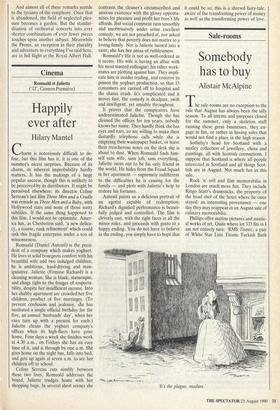Cinema
Romuald et Juliette ('12', Cannon Premiere)
Happily ever after
Hilary Mantel
Charm is notoriously difficult to de- fine, but this film has it; it is one of the summer's nicest surprises. Because of its charm, its inherent improbability hardly matters. It has the makings of a huge popular success, though this is unlikely to be perceived by its distributors. It might be perceived elsewhere: its director Coline Serreau's last film Three Men and a Cradle was remade as Three Men and a Baby, with Hollywood stars and none of those nasty subtitles. If the same thing happened to this film, I would not be optimistic. Amer- ica has, as Chesterton said, 'a new delica- cy, a coarse, rank refinement' which could sink this fragile enterprise under a ton of winsomeness.
Romuald (Daniel Auteuil) is the presi- dent of a company which makes yoghurt. He lives in solid bourgeois comfort with his beautiful wife and two indulged children; he is ambitious, hard-driving and man- ipulative. Juliette (Firmine Richard) is a cleaning woman. She is black, statuesque, and clings tight to the fringes of respecta- bility, despite her insufficient income. Into her shabby apartment are crowded her five children, product of five marriages. (To prevent confusion and jealousy, she has instituted a single official birthday for the five, an annual 'husbands' day', when her exes turn up with a present for each.) Juliette cleans the yoghurt company's offices when its high-fliers have gone home. Four days a week she finishes work at 4.30 a.m., on Fridays she has an easy time of it, and is through by one a.m. She goes home on the night bus, falls into bed, and gets up again at seven a.m. to see her children off to school.
Coline Serreau cuts nimbly between these two lives; Romuald addresses the board, Juliette trudges home with her shopping bags. In several short scenes she contrasts the cleaner's circumscribed and anxious existence with the glossy opportu- nities for pleasure and profit her boss's life affords. But social comment runs smoothly and unobtrusively under some excellent comedy; we are not preached at, nor asked to believe that poverty does not matter to a loving family. Nor is Juliette turned into a saint; she has her areas of ruthlessness.
Romuald's life is not as well-ordered as it seems. His wife is having an affair with his most trusted colleague; his other work- mates are plotting against him. They impli- cate him in insider trading, and contrive to poison the yoghurt production, so that 15 consumers are carried off to hospital and the shares crash. It's complicated and it moves fast; the comedy is deadpan, swift and intelligent, yet amiable throughout.
It proves that the conspirators have underestimated Juliette. Though she has cleaned the offices for ten years, nobody knows her name. They hardly think she has eyes and ears, so are willing to make their dastardly telephone calls while she is emptying their wastepaper basket, or leave their treacherous notes on the desk she is about to dust. When Romuald finds him- self sans wife, sans job, sans everything, Juliette turns out to be his only friend in the world. He hides from the Fraud Squad in her apartment — supremely indifferent to the difficulties he is causing for the family — and plots with Juliette's help to restore his fortunes.
Auteuil paints us a delicious portrait of an egotist capable of redemption; Richard's dignified performance is beauti- fully judged and controlled. The film is cleverly cast, with the right faces in all the minor roles, and proceeds with gusto to a happy ending. You do not have to believe in the ending, you simply have to hope that it could be so; this is a shrewd fairy-tale, aware of the transforming power of money as well as the transforming power of love.










































 Previous page
Previous page